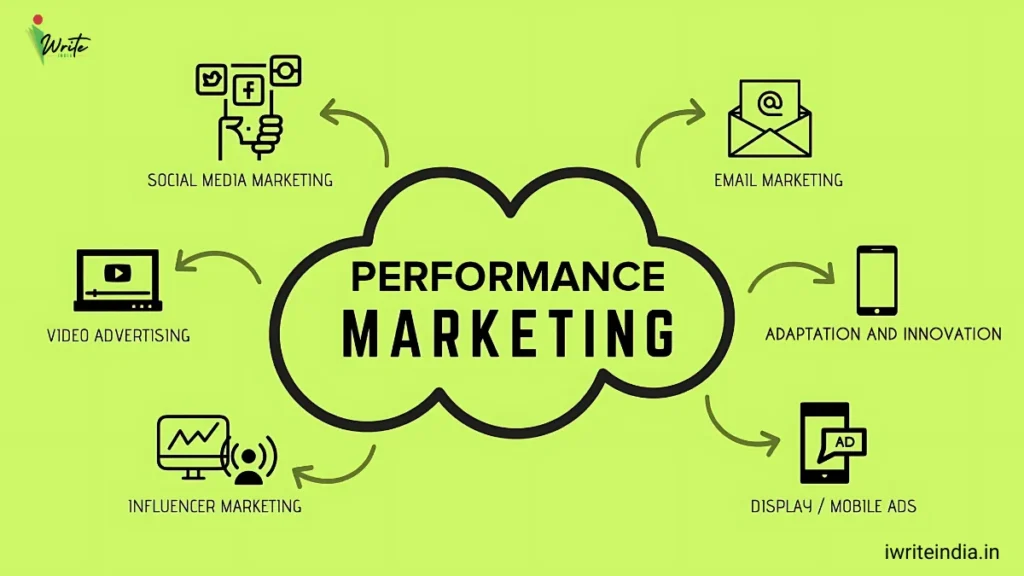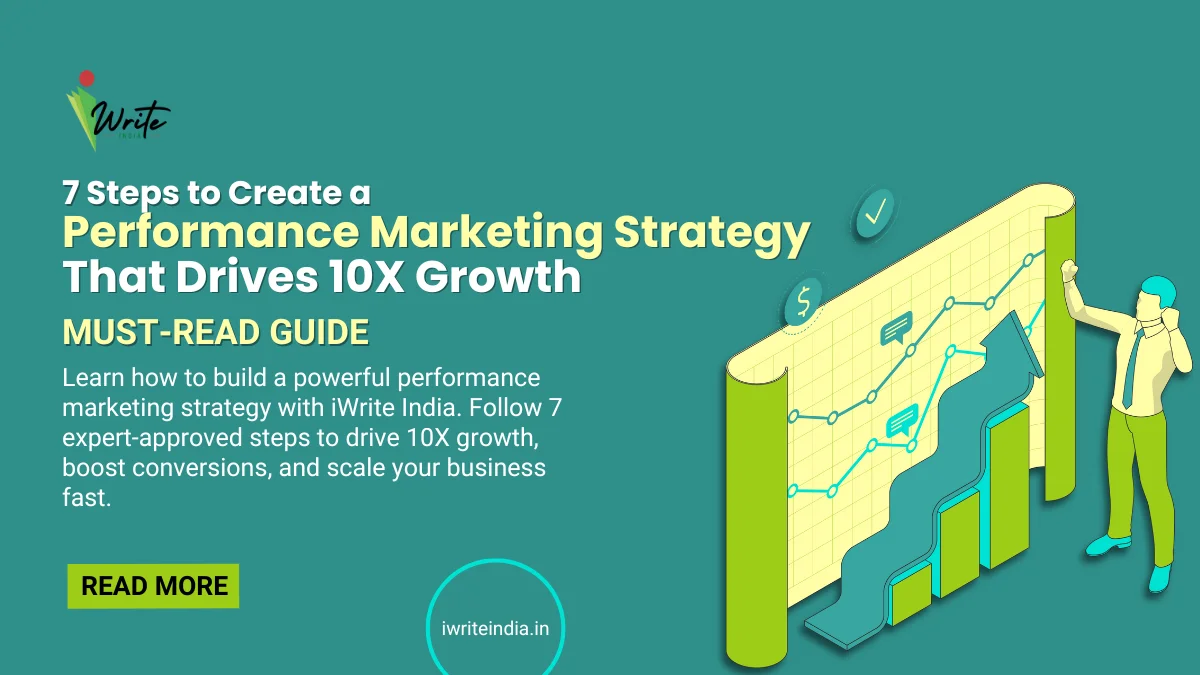|
Getting your Trinity Audio player ready...
|
Are you a brand facing a big question: Should we go all in on performance marketing to see fast, measurable results? Or focus on brand marketing to build deeper trust and long-term loyalty?
It’s not an easy call.
With consumer behaviour shifting rapidly and marketing tools getting smarter by the day, the line between these two strategies is getting fuzzier. Still, their individual strengths remain crystal clear.
This blog breaks down the ongoing debate—performance marketing vs brand marketing—with fresh insights, current trends, and real-world tips to help you strike the right balance for your business in 2025 and beyond.
What is Performance Marketing?

Performance marketing is a data-driven approach where advertisers only pay for specific actions—clicks, leads, conversions, or sales. It’s results-oriented, highly measurable, and perfect for short-term goals.
Key Traits:
- Pay-per-action model
- ROI-focused
- Instant metrics and real-time optimization
- Ideal for startups and ROI-conscious brands
Popular channels: Google Ads, Facebook Ads, affiliate marketing, influencer collaborations with performance KPIs.
What is Brand Marketing?

Brand marketing focuses on shaping public perception, telling your story, and fostering emotional connections with your audience. It builds trust, credibility, and long-term customer loyalty.
Key Traits:
- Storytelling-driven
- Long-term value creation
- Emotional engagement
- Supports premium pricing and brand recall
Popular channels: TV, print, podcasts, branded content, influencer marketing (branding-first), and social storytelling.
Performance Marketing vs Brand Marketing: Key Differences
| Criteria | Performance Marketing | Brand Marketing |
| Objective | Drive conversions/sales quickly | Build awareness, trust, loyalty |
| Time Horizon | Short-term ROI | Long-term brand equity |
| Measurement | Clicks, impressions, ROAS, CPL, CPA (performance marketing measurement) | Awareness, recall, sentiment (brand marketing measurement) |
| Budget Flexibility | Adjustable, scalable on demand | Often requires upfront investment |
| Risk Level | Low, with clear KPIs | Higher, with delayed returns |
| Success Examples | D2C campaigns, ecommerce, flash sales | Coca-Cola, Nike, Apple campaigns |
Latest Trends in 2025: Which Way is the Wind Blowing?
The world of marketing in 2025 is evolving faster than ever, with innovations in AI, influencer strategy, and analytics transforming how businesses approach both performance marketing and brand marketing.
- AI-Powered Ad Targeting: Platforms now auto-optimise creatives and budgets in real time, making performance marketing more accessible than ever.
- Zero-Click Content: With social media platforms reducing outbound traffic, brand marketing is playing a bigger role in engagement and trust-building.
- Influencer Strategy Shift: Micro-influencers are being used both for performance (affiliate codes) and brand storytelling.
- Customer Experience as Marketing: Brands are investing in consistent, branded experiences across touchpoints, marrying both performance and brand goals.
- Measurement Tools Evolving: Platforms like Meta, Google, and HubSpot are enhancing their analytics suites to offer better brand marketing measurement and performance marketing measurement capabilities.
Whether you’re chasing quick wins or long-term growth, these trends prove one thing: the smartest brands are blending performance marketing services with strong brand narratives to stay relevant and competitive.
How Does Performance Marketing Help?
When you’re looking to drive fast results and real-time growth, performance marketing is the go-to strategy, especially in a digital landscape that rewards precision and speed.
- Speed: You get instant visibility, traffic, and results.
- Measurability: With performance marketing measurement tools, you can track every click and conversion.
- Scalability: It allows businesses to scale budgets based on performance data.
- Profitability: Performance marketing services offer targeted ROI with minimal risk.
If you’re ready to amplify reach and revenue, consider working with a performance marketing company in Delhi. They bring local insights and advanced performance marketing measurement techniques that make every click count.
Why Do You Need Brand Marketing?
In a world where consumers are overwhelmed with choices, brand marketing is your edge; it’s what makes people choose you, not just once, but again and again.
- Trust & Loyalty: Consumers buy from brands they recognize and trust.
- Emotional Resonance: A strong brand narrative creates long-term value.
- Price Premiums: Brand loyalty reduces price sensitivity.
- Crisis Resistance: Established brands recover faster from PR issues or downturns.
Thanks to advanced brand marketing measurement tools in 2025, marketers can now track the real ROI of trust, loyalty, and brand equity, making brand marketing an investment, not just a cost.
Can They Coexist? The New Hybrid Model
Absolutely! In fact, 2025’s most successful marketing strategies blend both approaches.
Here’s how:
- Top Funnel: Brand marketing to drive awareness and trust.
- Mid Funnel: Retargeting via performance marketing to convert interest into action.
- Bottom Funnel: Precision performance ads to drive conversions.
This synergy ensures that while your performance marketing delivers trackable ROI, brand marketing builds sustainability.
How to Choose Performance Marketing vs Brand Marketing?

Choosing between performance marketing and brand marketing isn’t a one-size-fits-all decision, it depends on your business goals, budget, and stage of growth.
Before you make a choice, you must ask yourself:
What Are Your Goals?
Short-term sales = performance. Long-term loyalty = brand.
What is Your Budget?
Performance scales flexibly; branding requires up-front investment.
Where is Your Brand in its Lifecycle?
New brands may need performance marketing first, followed by branding as they grow.
Still unsure? A trusted performance marketing company in Delhi can help you craft a custom, integrated approach that aligns your immediate objectives with your long-term vision.
Tools for Measurement
In 2025, marketing success is no longer just about gut feeling—thanks to powerful performance marketing measurement and brand marketing measurement tools, every decision can now be backed by data.
Performance Marketing Measurement Tools:
- Google Analytics 4
- Meta Business Suite
- Google Ads Dashboard
- HubSpot or ActiveCampaign
Brand Marketing Measurement Tools:
- Brand Lift by Google
- Nielsen Brand Effect
- Social listening platforms (e.g., Brandwatch, Talkwalker)
- Surveys and NPS scores
Whether you’re optimising ads with Google Analytics 4 or tracking brand sentiment through Nielsen Brand Effect, using the right tools empowers you to invest smarter, track better, and grow faster.
Final Verdict: What Will Dominate 2025?
Neither wins alone. The future lies in integration. The brands that dominate 2025 will be those that can combine the precise ROI of performance marketing with the emotional power of brand marketing.
Invest in both—smartly.
Quickly Again – Performance Marketing vs Brand Marketing
What should you choose for your business? Performance marketing or brand marketing?
Performance marketing delivers measurable, short-term results like clicks and sales, while brand marketing builds long-term trust, loyalty, and market presence. The best marketing strategy in 2025 will likely combine both for optimal ROI and sustained growth.

Your Next Marketing Breakthrough Starts Here
Looking to build a brand that converts and connects? iWrite India is your go-to performance marketing company in Delhi, offering full-stack Performance Marketing Services tailored for modern businesses. Whether you need brand storytelling, high-converting ad campaigns, or a strategy that fuses both, our team has the expertise to elevate your digital presence.
FAQs About Performance Marketing and Brand Marketing
Q1. What is the biggest difference between performance marketing and brand marketing?
The main difference lies in the goal: performance marketing targets short-term, trackable results like leads or sales, while brand marketing focuses on long-term awareness and loyalty.
Q2. Can small businesses afford both performance and brand marketing?
Yes! Start small with performance ads to generate income, and invest a portion of that into consistent branding efforts over time. Even simple brand storytelling builds equity.
Q3. How do you measure brand marketing?
While not as direct as performance metrics, brand marketing measurement includes tracking brand mentions, customer sentiment, NPS (Net Promoter Score), and repeat engagement.
Q4. Is performance marketing enough for long-term growth?
Not really. While performance ads deliver quick wins, without a strong brand, customer loyalty and organic growth suffer. A balanced approach drives sustainable growth.
Q5. Why should I hire a performance marketing company in Delhi like iWrite India?
iWrite India brings deep local and global experience, helping you drive ROI through data-backed campaigns while also amplifying your brand’s presence with strategic storytelling.
Q6. How long does it take to see results from brand marketing?
Brand marketing is a long-term investment. On average, it can take 6–12 months to see measurable improvements in brand awareness, sentiment, and customer loyalty. However, consistent messaging can yield early trust signals within weeks.
Q7. What industries benefit the most from performance marketing?
E-commerce, SaaS, fintech, and D2C brands see quick returns from performance marketing due to their digital-first nature. These industries thrive on conversions, making measurable campaigns highly effective.
Q8. Are there any tools that support both performance and brand marketing?
Yes. Tools like HubSpot, SEMrush, and Google Analytics 4 allow for performance tracking, while platforms like Brandwatch and Sprout Social help monitor brand sentiment, engagement, and awareness—bridging the gap between both strategies.
Q9. What are some common mistakes when combining performance and brand marketing?
The biggest mistake is treating them as separate silos. Others include inconsistent messaging, neglecting long-term brand building, over-optimizing for short-term results, and not integrating data insights across teams.
Q10. How can storytelling enhance performance marketing results?
When storytelling is embedded in performance campaigns, it boosts emotional engagement, increases ad recall, and improves conversion rates. A relatable story builds trust faster than a direct sales pitch alone.




